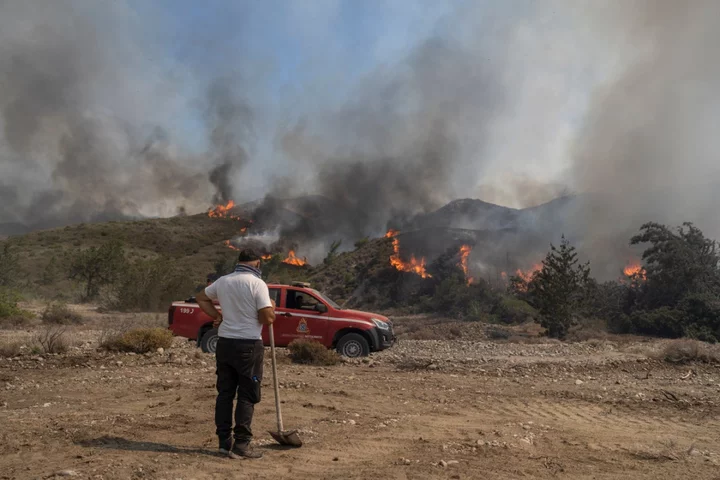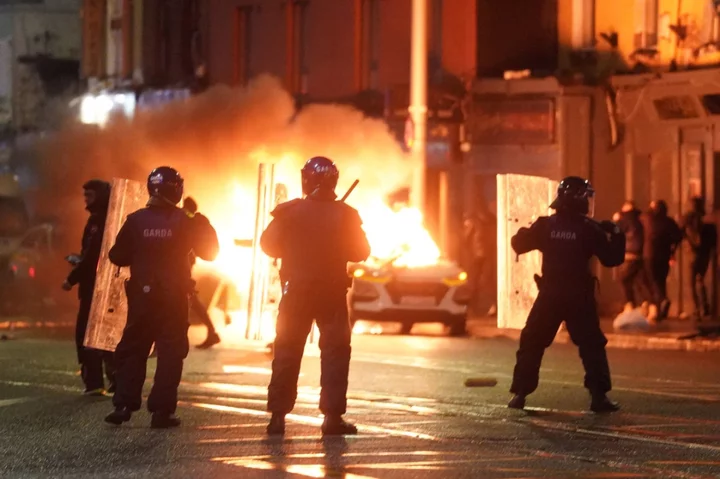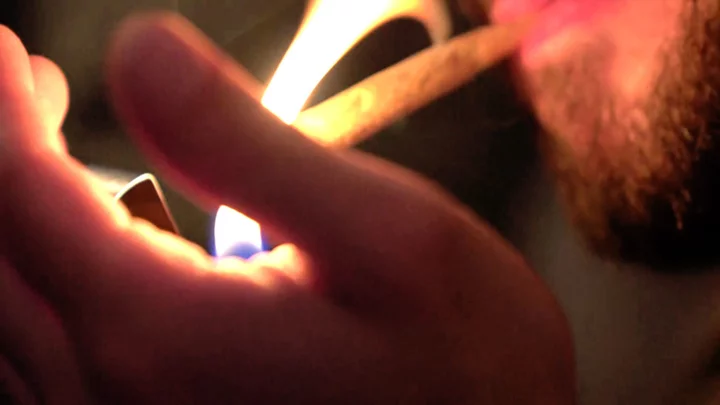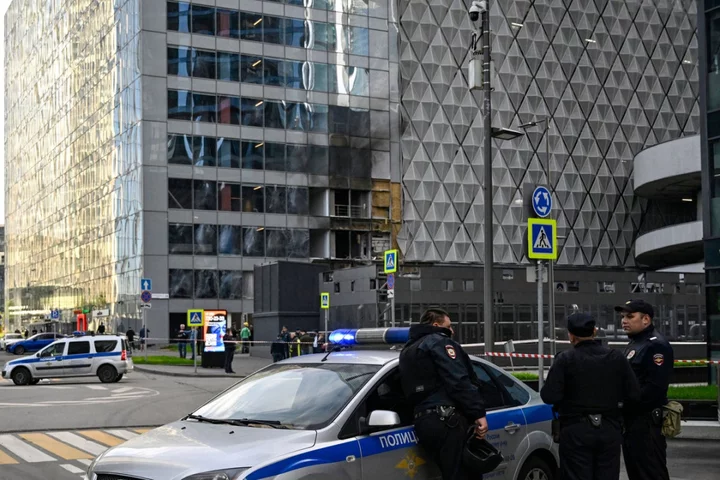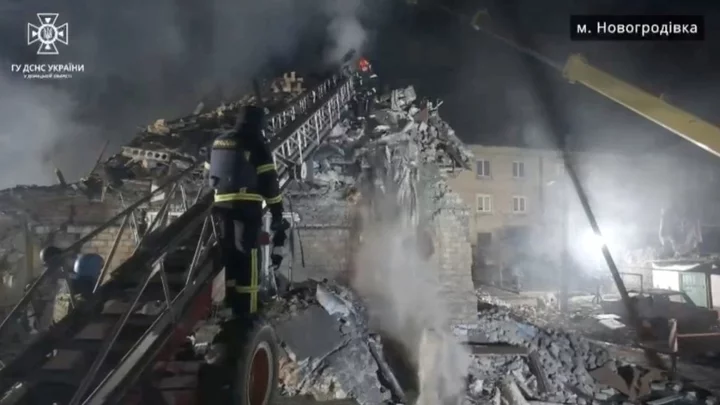“And just like that, it’s gone”, 75-year-old Elpida Voyatzisaid said softly, standing outside her home in Kiotari – a town left devastated by the wildfires that raged for 10 straight days on the island of Rhodes. Where once stood land devoid of all but a single tree, Elpida and her husband have spent the past 20 years nurturing a bountiful farm, its acres of trees and vines bursting with grapes, olives, pomegranates and figs. While the flames stopped just a few metres short of her home and holiday apartments, behind her lay the burnt-out husks of close to a dozen houses overlooking the beach – the final point in a path of destruction forged by the fire at terrifying speed. The inferno’s rapid advance forced the mass evacuation of British tourists from resorts in the island’s southeast – with accounts of holidaymakers fleeing for miles along beaches in the middle of the night leading tour operators to cancel thousands of people’s trips this week. But with the blazes now largely under control, and the damage confined to just a handful of hotels, the fear for many residents is that tourists could be unnecessarily hesitant to visit the island – whose economy is almost entirely fuelled by the summer holiday trade. For those in the few villages hit by the fire, such as Kiotari, the impact is clear. “What a disaster,” said Elpida, adding: “We told [our rental apartment visitors] not to come, because what are they coming to? To see what sights? It’s going to be depressing for them. The tourist season is over for us.” Her daughter, Fedra, who emigrated from Canada with her husband to take over the farm just months ago, hopes that with regenerative practices it could take five years – rather than another 20 – to regrow. Her other income stream, a school she opened on the farm to teach locals lessons in English and outdoor education, has also been destroyed in the fire. “People’s livelihoods, they’re literally in ashes,” said Nicole, a 44-year-old wedding planner, whose home was among those in Kiotari reduced to rubble and embers by the fires. “If you have money, you can regain everything. If you don’t have money, I don’t know where you will start.” Pointing to the three months of €534 in support for those impacted by the fire announced by Greek labour minister Adonis Georgiadis, Nicole said of the wider community in Kiotari: “So we’re going to live on €1,500 euros for a family of five.” “We’re grateful for any help,” she added, “but it won’t sustain what people have lost.” Because of the mass evacuation and decision by tour operators to cancel holidays this week, those living in areas untouched by the fire are also feeling the squeeze, and are anxiously hoping visitor numbers will bounce back rapidly. Most businesses make their money for the year during the six summer months, with July and August the season’s peak, and those spoken to by The Independent in towns in the south of Rhodes without exception feared a difficult winter could lie ahead. “Rhodes is a huge island, but everyone is reliant on tourism,” said Antonis Chatzimichalis, a 21-year-old University College London Master’s student from the town of Archangelos, who had been volunteering at the evacuation centre set up there for displaced tourists and locals. “It’s like a chain – the suppliers, the local people, restaurants, everyone” needs tourism. Argedis and Katarini Ganotakis, aged 63 and 56, have owned hotels in nearby Pefkos since 2002, and run a restaurant in the picturesque cliffside village of Lindos, where British tourists were evacuated last week. While Lindos was untouched by the fire, the week’s cancellations had cost the family “a lot”, he said, adding: “If the lack of customers lasts five to 10 days, we can keep our staff. But longer – it’s a problem. If we go longer than 10 days without people in our hotels, the business cannot keep them on … [it] must close. Then everybody loses.” The owner of one of several gift shops in Lindos said her sales had fallen 70 per cent this week, while Mariana Nefeli, who has owned a neighbouring restaurant for 34 years, added: “After Covid it was two years without work, and now this happens again.” Eirini Kousoulini, a restaurant owner in Malonas, a village narrowly saved from the fire, said “everybody” is worried about a hit to tourism. The winter will be hard, she added, “because everything is very expensive – life, the supermarkets, electricity, everything … I have to work 18 hours here every day.” But Rhodes deputy mayor Konstantinos Taraslias was sanguine about the impact on those in areas not hit directly by the fires and cancellations. “The loss is in this area,” he said, circling the evacuated region on a map on his office desk. “Everything else is okay.” Other areas will only see a knock-on effect if “the tourists don’t book to come to Rhodes because they think it is a disaster [zone]”, he said, adding: “Of course that would be a catastrophe for the economy.” Pointing to the fact that just 10,000 of Rhodes’ 220,000 hotel beds are in the affected area, he insisted that some damaged hotels will reopen in just one or two weeks’ time, with hopes to extend this year’s tourist season until November. “We will lose seven days. Seven days is no problem,” he said. “Yesterday I was talking with the local Jet2 agent, and they said: ’Starting from Monday, business as usual.’ That’s a very good message, it’s very important.” Alongside the €534 payments, those who have seen their property and livelihoods destroyed by the fire “won’t have to pay taxes for a long time”, and the regional authorities will work to rebuild the surrounding area, Mr Taraslias said. But anger at the regional government is running high in Rhodes, with many blaming a sluggish initial response to the fire and poor forest management spanning decades for how far the blaze was able to spread. Alongside trained firefighters, the heroes of the hour are deemed across Rhodes to be the thousands of civilians who have fearlessly taught themselves to beat back the fires over 10 consecutive days and nights. “If we didn’t have all the volunteers, all of the island would have been burnt, that’s for sure,” said Stavros, a 48-year-old teacher from the northeastern city of Rhodes, as he rested in the frontline village of Vati between trips into the hills to douse new flare-ups with his 18-year-old son. As well as their homes and livelihoods, civilian firefighters in Rhodes have been fighting to protect the animals with whom they share the island, and whose charred carcasses were visible from the roadside earlier this week. Among them is the Dama-Dama deer, a protected species unique to Rhodes and viewed as a symbol of the island. Some had been taken to safety by volunteers, who left the animals bowls of water and food among the smouldering hills. Pantelis Saroukos, a volunteer firefighter, drove The Independent through nearby hills where he – along with many other beekeepers – had brought his hives each summer for the past five years, due to the abundant thyme growing there, now irrecoverably scorched by flames. “This is the worst sight to see,” he said, gazing at all that remained of the precious herbs. While Pantelis, aged 45, was able to rescue his hives before the fire reached them, a fellow beekeeper several kilometres away near the village of Asklipio was not so lucky. “If I was this beekeeper, I would not bring my bees back here ever in my life,” said Pantelis, lamenting that it would take 25 to 30 years for the landscape to regrow. “Maybe his grandchildren can.” He mused: “Prime Minister Kyriakos Mitsotakis was proud to say no lives were lost before the Canadair crash [which killed two pilots near Athens this week]. But I don’t know if someone told him about the deer, donkeys, tortoises ... thousands of animals have been killed.” A fish farmer by trade, Pantelis expressed concern over the toxic impact of the fire debris upon the fish and other aqautic life as it washes into the rivers and sea. He is not alone in fearing what autumn’s rains will bring – with several locals warning that the first heavy rainfall on drought-parched and fire-scorched earth could cause floods and landslides, hitting towns and villages, as happened after last year’s huge fires in Evia, near Athens. Work is under way to prevent flooding with irrigation channels to steer rainwater away from settlements, the deputy mayor said, stressing the importance of properly clearing the area of debris and carefully planning how the forests should be regrown. Noting that a discussion around better forest management must take place, Mr Taraslias criticised a belief among officials that preserving nature meant not cutting a single more tree than necessary. “We must find a way to clean the forests” rather than allow them to become dense with flammable pine needles, he said. But some of the island’s residents, encouraged by the huge community push to fight this month’s wildfires – and who currently risk breaking the law by cutting down trees to create firebreaks – are eager to ensure that Rhodes does not suffer such a tragedy again. “We have to better protect the forests … for our children, for our futures,” said Pantelis, driving through the incinerated landscape as embers smouldered and firefighting planes flew in the skies above. “We cannot wait for the government. We should take our future into our own hands.” Read More The climate crisis will irrevocably change how we holiday: Here’s what the future of travel looks like Britons face ‘absolute nightmare’ trying to get refunds for Rhodes holidays Winds fuel fire flare-ups in Rhodes as state of emergency declared across island More than 40 people killed as wildfires rage in nine Mediterranean countries in record heatwave
“And just like that, it’s gone”, 75-year-old Elpida Voyatzisaid said softly, standing outside her home in Kiotari – a town left devastated by the wildfires that raged for 10 straight days on the island of Rhodes.
Where once stood land devoid of all but a single tree, Elpida and her husband have spent the past 20 years nurturing a bountiful farm, its acres of trees and vines bursting with grapes, olives, pomegranates and figs.
While the flames stopped just a few metres short of her home and holiday apartments, behind her lay the burnt-out husks of close to a dozen houses overlooking the beach – the final point in a path of destruction forged by the fire at terrifying speed.
The inferno’s rapid advance forced the mass evacuation of British tourists from resorts in the island’s southeast – with accounts of holidaymakers fleeing for miles along beaches in the middle of the night leading tour operators to cancel thousands of people’s trips this week.
But with the blazes now largely under control, and the damage confined to just a handful of hotels, the fear for many residents is that tourists could be unnecessarily hesitant to visit the island – whose economy is almost entirely fuelled by the summer holiday trade.
For those in the few villages hit by the fire, such as Kiotari, the impact is clear.
“What a disaster,” said Elpida, adding: “We told [our rental apartment visitors] not to come, because what are they coming to? To see what sights? It’s going to be depressing for them. The tourist season is over for us.”
Her daughter, Fedra, who emigrated from Canada with her husband to take over the farm just months ago, hopes that with regenerative practices it could take five years – rather than another 20 – to regrow. Her other income stream, a school she opened on the farm to teach locals lessons in English and outdoor education, has also been destroyed in the fire.
“People’s livelihoods, they’re literally in ashes,” said Nicole, a 44-year-old wedding planner, whose home was among those in Kiotari reduced to rubble and embers by the fires. “If you have money, you can regain everything. If you don’t have money, I don’t know where you will start.”
Pointing to the three months of €534 in support for those impacted by the fire announced by Greek labour minister Adonis Georgiadis, Nicole said of the wider community in Kiotari: “So we’re going to live on €1,500 euros for a family of five.”
“We’re grateful for any help,” she added, “but it won’t sustain what people have lost.”
Because of the mass evacuation and decision by tour operators to cancel holidays this week, those living in areas untouched by the fire are also feeling the squeeze, and are anxiously hoping visitor numbers will bounce back rapidly.
Most businesses make their money for the year during the six summer months, with July and August the season’s peak, and those spoken to by The Independent in towns in the south of Rhodes without exception feared a difficult winter could lie ahead.
“Rhodes is a huge island, but everyone is reliant on tourism,” said Antonis Chatzimichalis, a 21-year-old University College London Master’s student from the town of Archangelos, who had been volunteering at the evacuation centre set up there for displaced tourists and locals. “It’s like a chain – the suppliers, the local people, restaurants, everyone” needs tourism.
Argedis and Katarini Ganotakis, aged 63 and 56, have owned hotels in nearby Pefkos since 2002, and run a restaurant in the picturesque cliffside village of Lindos, where British tourists were evacuated last week.
While Lindos was untouched by the fire, the week’s cancellations had cost the family “a lot”, he said, adding: “If the lack of customers lasts five to 10 days, we can keep our staff. But longer – it’s a problem. If we go longer than 10 days without people in our hotels, the business cannot keep them on … [it] must close. Then everybody loses.”
The owner of one of several gift shops in Lindos said her sales had fallen 70 per cent this week, while Mariana Nefeli, who has owned a neighbouring restaurant for 34 years, added: “After Covid it was two years without work, and now this happens again.”
Eirini Kousoulini, a restaurant owner in Malonas, a village narrowly saved from the fire, said “everybody” is worried about a hit to tourism. The winter will be hard, she added, “because everything is very expensive – life, the supermarkets, electricity, everything … I have to work 18 hours here every day.”
But Rhodes deputy mayor Konstantinos Taraslias was sanguine about the impact on those in areas not hit directly by the fires and cancellations.
“The loss is in this area,” he said, circling the evacuated region on a map on his office desk. “Everything else is okay.” Other areas will only see a knock-on effect if “the tourists don’t book to come to Rhodes because they think it is a disaster [zone]”, he said, adding: “Of course that would be a catastrophe for the economy.”
Pointing to the fact that just 10,000 of Rhodes’ 220,000 hotel beds are in the affected area, he insisted that some damaged hotels will reopen in just one or two weeks’ time, with hopes to extend this year’s tourist season until November. “We will lose seven days. Seven days is no problem,” he said.
“Yesterday I was talking with the local Jet2 agent, and they said: ’Starting from Monday, business as usual.’ That’s a very good message, it’s very important.”
Alongside the €534 payments, those who have seen their property and livelihoods destroyed by the fire “won’t have to pay taxes for a long time”, and the regional authorities will work to rebuild the surrounding area, Mr Taraslias said.
But anger at the regional government is running high in Rhodes, with many blaming a sluggish initial response to the fire and poor forest management spanning decades for how far the blaze was able to spread.
Alongside trained firefighters, the heroes of the hour are deemed across Rhodes to be the thousands of civilians who have fearlessly taught themselves to beat back the fires over 10 consecutive days and nights.
“If we didn’t have all the volunteers, all of the island would have been burnt, that’s for sure,” said Stavros, a 48-year-old teacher from the northeastern city of Rhodes, as he rested in the frontline village of Vati between trips into the hills to douse new flare-ups with his 18-year-old son.
As well as their homes and livelihoods, civilian firefighters in Rhodes have been fighting to protect the animals with whom they share the island, and whose charred carcasses were visible from the roadside earlier this week.
Among them is the Dama-Dama deer, a protected species unique to Rhodes and viewed as a symbol of the island. Some had been taken to safety by volunteers, who left the animals bowls of water and food among the smouldering hills.
Pantelis Saroukos, a volunteer firefighter, drove The Independent through nearby hills where he – along with many other beekeepers – had brought his hives each summer for the past five years, due to the abundant thyme growing there, now irrecoverably scorched by flames. “This is the worst sight to see,” he said, gazing at all that remained of the precious herbs.
While Pantelis, aged 45, was able to rescue his hives before the fire reached them, a fellow beekeeper several kilometres away near the village of Asklipio was not so lucky. “If I was this beekeeper, I would not bring my bees back here ever in my life,” said Pantelis, lamenting that it would take 25 to 30 years for the landscape to regrow. “Maybe his grandchildren can.”
He mused: “Prime Minister Kyriakos Mitsotakis was proud to say no lives were lost before the Canadair crash [which killed two pilots near Athens this week]. But I don’t know if someone told him about the deer, donkeys, tortoises ... thousands of animals have been killed.”
A fish farmer by trade, Pantelis expressed concern over the toxic impact of the fire debris upon the fish and other aqautic life as it washes into the rivers and sea.
He is not alone in fearing what autumn’s rains will bring – with several locals warning that the first heavy rainfall on drought-parched and fire-scorched earth could cause floods and landslides, hitting towns and villages, as happened after last year’s huge fires in Evia, near Athens.
Work is under way to prevent flooding with irrigation channels to steer rainwater away from settlements, the deputy mayor said, stressing the importance of properly clearing the area of debris and carefully planning how the forests should be regrown.
Noting that a discussion around better forest management must take place, Mr Taraslias criticised a belief among officials that preserving nature meant not cutting a single more tree than necessary. “We must find a way to clean the forests” rather than allow them to become dense with flammable pine needles, he said.
But some of the island’s residents, encouraged by the huge community push to fight this month’s wildfires – and who currently risk breaking the law by cutting down trees to create firebreaks – are eager to ensure that Rhodes does not suffer such a tragedy again.
“We have to better protect the forests … for our children, for our futures,” said Pantelis, driving through the incinerated landscape as embers smouldered and firefighting planes flew in the skies above. “We cannot wait for the government. We should take our future into our own hands.”
Read More
The climate crisis will irrevocably change how we holiday: Here’s what the future of travel looks like
Britons face ‘absolute nightmare’ trying to get refunds for Rhodes holidays
Winds fuel fire flare-ups in Rhodes as state of emergency declared across island
More than 40 people killed as wildfires rage in nine Mediterranean countries in record heatwave

